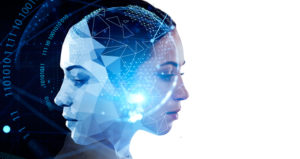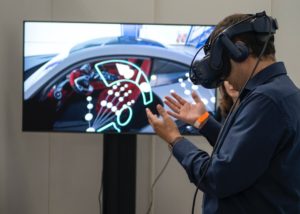Technology is relentlessly evolving. In the next 10 years, its rapid development has the power to revolutionise everything from transportation to medicine to voting systems.
Here is what we can expect from technology in the coming year.
Top Tech Trends – 2025.
Artificial Intelligence.
2025 will see AI move beyond basic automation and into the widespread integration of AI into our daily routines. We can expect to see sophisticated personal AI assistants who can predict our needs.
Customer service functions will develop to include AI-powered chatbots that provide personalised and efficient support indistinguishable from their human counterparts.
In addition, Gartner predicts that AI will evolve into decision-making agents. Instead of summarising information, AI will be capable of making optimal decisions on behalf of consenting individuals.

AI and Governance.
With concerns around model bias, AI governance platforms and tools are being developed to help build trust, ethics and transparency. These may include features like explanations for, and of, AI-generated answers to prevent harmful outputs.
Generative AI and disinformation.
The sophistication of Generative AI allows bad actors to create fake media. These synthetic images, videos and voices have the power to falsely represent organisations and impersonate people.
Advances in disinformation security tools will assist organisations in identifying deepfakes. They will also detect fake media by assessing truth, and tracking the journey of disinformation.

Smart Cities.
It’s anticipated that 2025 will see a surge in smart city projects. Interconnected systems of sensors, devices, and data will evolve to enhance efficiency. These interconnections will also reduce the environmental impact and give residents a better quality of life.
Traffic lights that adapt to traffic patterns and waste management systems able to optimise collection routes are just a couple of examples of “smart” city initiatives that will revolutionise experiences of urban living.
The Internet of Things (IOT).
From smartwatches to industrial equipment, the web of connected devices is set to explode in 2025. The insights and data gathered from these systems generate valuable information for businesses and governments.
The benefits extend across various sectors. Data can be used to develop adaptive, real-time intelligence systems that enhance both efficiency and productivity.

Bioprinting – revolutionising medical care and manufacturing.
Also known as 3D bioprinting, Bioprinting uses living cells and biomaterials to create three-dimensional tissues and organs. This technology is expected to advance in 2025 and will bring us closer to personalised medicine. Printing replacement tissues or even entire organs for transplantation will have the power to eliminate organ donor waiting lists.
Bioprinting will have significant implications for other areas of healthcare. Breakthroughs in drug discovery and disease modelling are also positive outcomes of advances in bioprinting.
Looking about 10 years into the future, Gartner also predicts the development of technologies that can read and enhance brain functions.
Ranging from simple wearables such as earbuds or headbands to complex integrated brain-computer interfaces, these neurological enhancement technologies could be used in settings including healthcare facilities to restore senses such as sight or hearing.

Extended Reality (XR).
Extended reality (XR) describes the meeting of augmented reality (AR) and virtual reality (VR).
AR overlays digital elements onto the real world, while VR creates entirely immersive virtual environments. In 2025, XR is set to move from niche applications to mainstream adoption and has the power to revolutionise experiences across sectors.
In retail environments, customers will be able to make informed purchase decisions by trying on clothes in their own homes.
Across training and development, XR will enable highly immersive and interactive learning experiences revolutionising training and education in schools, colleges and organisations alike.

Spatial computing.
Along a similar theme, it’s suggested that Spatial Computing will evolve to bring the physical and digital realms together into a single, unified 3D space.
Using devices like Augmented Reality headsets and other applications, just-in-time contextualisation will be possible for making decisions in places like the manufacturing shop floor.
Quantum Computing.
Quantum computers harness the potential of qubits. Qubits can exist in multiple states simultaneously. This allows them to perform complex calculations much faster than classical computers
Though still in its early stages, 2025 is expected to bring significant advances in quantum computing. It has the potential to impact fields like materials science, drug discovery, financial modelling and renewable energy.

Energy efficient computing.
In the next year, it’s also likely that C-level executives will explore energy-efficient computing. This includes initiatives including moving energy-intensive algorithms to green cloud providers, rewriting algorithms to consume less energy, or more closely monitoring energy use for generative AI.

Cyber security
In 2025 we expect to see a rise in sophisticated cyberattacks targeting critical infrastructure, businesses, and individuals.
Consequently, our need for robust cybersecurity solutions is ever more important.
In 2025, experts recommend that organisations will invest in advanced cybersecurity measures such as AI-driven threat detection systems and zero-trust security models.
Individually, we should protect our personal information online by practicing safe digital habits.
Blockchain.
Blockchain technology (the distributed ledger system supporting cryptocurrency) will revolutionise how we store and share data. In 2025, blockchain applications will extend beyond financial transactions. Supply Chain Management, healthcare and voting systems security will also adopt blockchain technology.

All these technologies are exciting and have the power to change many of our daily experiences. Changes to how we shop, how we perform our jobs or train for a new one are all on the cards in 2025 and beyond.
It’s still a couple of months before January comes around. At the rate technology advances, it could be that this list needs to be a little longer! What are your predictions for technology in 2025?
Leave your thoughts in the comments below!





